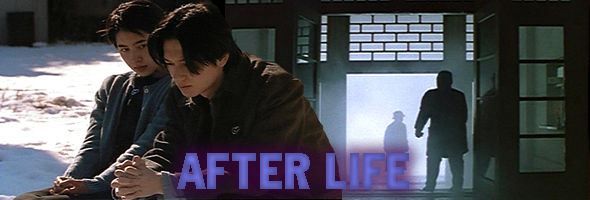
Color, 1998, 118m. / Directed by Hirokazu Kore-eda / Starring Erika Oda, Arata, Susumu Terajima / New Yorker (US R1 NTSC) / WS (1.66:1) / DD2.0
The question of what happens after we die has been addressed in hundreds of films, but the approach of After Life (originally known in Japan as Wandafuru raifu, or Wonderful Life) will seem fresh and completely original to most viewers. The decidedly Eastern approach to the central issue resonates The most striking innovation of After Life is its portrayal of a spiritual plane without any kind of camera filters, special effects, wispy new age music, or emotive dramatics. The camerawork is often hand held, filming in subdued and often gritty colours, while dialogue is presented as recorded on the set. The result is a feeling of startling immediacy and an almost painful intimacy with the characters, which makes the transcendent final third of the film all the more effective. The film ultimately raises more questions than it answers -- just imagine some of the "perfect moment" scenarios that could not possibly ever be recreated - and the continuity between dream memories and real memories, not to mention recreation with the people themselves versus actors, is never really resolved. However, these ambiguous touches also enrich the film, which gains in mystery after the end credits have rolled. The ultimate question, of course, is then posed to the viewer: how would you choose one moment, and would that really feel like heaven to you? New Yorker's DVD of looks as good as could be expected from the borderline verite shooting style. The image is moderately letterboxed at just under 1.66:1, revealing a bit more than was visible in US theatrical screenings, while the audio gets the job done without much fuss. The compression job appears to be competent, while extras include both the US and Japanese trailers, as well as an intriguingly designed inner booklet. Already something of a cult hit in the making, this is a film well worth visiting and recommended to anyone who enjoys a solid, thoughtful contemplation on mortality and the ultimate longing for happiness.
Colour, 1995, 110m. / Directed by Hirokazu Kore-eda / Starring Makiko Esumi, Takashi Naitô, Tadanobu Asano / New Yorker (US R1 NTSC) / WS (2.00:1)
Apart from the lack of an insane or twisted main character, this would make perfect companion viewing with any Werner Herzog film. This hypnotic and visually stunning widescreen treasure marked the feature directorial debut of Hirokazu Kore-eda, whose artful control of the medium was already well in evidence. New Yorker's DVD is visually pleasing, offering a widescreen presentation at approximately 2.00:1 with burned-in English subtitles for the Japanese dialogue. The mono sound is clear and intelligible enough, though with such a tranquil film the presence of pure, unadulterated silence is the most important thing. The disc also includes both the US and Japanese trailers, which appropriately make this look like a cross between Ingmar Bergman and Yasujiro Ozu, as well as a variety of factual profiles on the director (who made his auspicious debut with this film) and the entire production process.
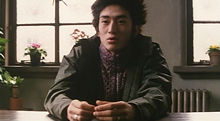 regardless of one's religious or cultural background, and what emerges is a deeply affecting, quiet little gem of a film. After death, people's spirits find themselves at a large, remote compound where they consult with an assigned counselor. On this particular week, twenty-two people arrive, divided among three counselors and one trainee, Shiori (Erika Oda). The counselors help their cases choose one moment from their lives to recreate, after which that person will spend eternity contemplating and residing within that single perfect setting. Some people cannot choose; others change their minds. A young girl wants to relive her trip to Disneyland, but Shiori convinces her to choose something more unique and personal. An older man cannot recall his ideal moment, so he endlessly scans videotapes of his life searching for a solution. And then there's the matter of another young man who, unwilling to depart into the great beyond, simply refuses to choose at all. Meanwhile the counselors find their own perceptions changing as well, particularly Takashi (Arata), conflicted between his growing friendship with Shiori and another more abstract demand which could finally put his mind at rest.
regardless of one's religious or cultural background, and what emerges is a deeply affecting, quiet little gem of a film. After death, people's spirits find themselves at a large, remote compound where they consult with an assigned counselor. On this particular week, twenty-two people arrive, divided among three counselors and one trainee, Shiori (Erika Oda). The counselors help their cases choose one moment from their lives to recreate, after which that person will spend eternity contemplating and residing within that single perfect setting. Some people cannot choose; others change their minds. A young girl wants to relive her trip to Disneyland, but Shiori convinces her to choose something more unique and personal. An older man cannot recall his ideal moment, so he endlessly scans videotapes of his life searching for a solution. And then there's the matter of another young man who, unwilling to depart into the great beyond, simply refuses to choose at all. Meanwhile the counselors find their own perceptions changing as well, particularly Takashi (Arata), conflicted between his growing friendship with Shiori and another more abstract demand which could finally put his mind at rest. 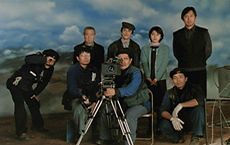
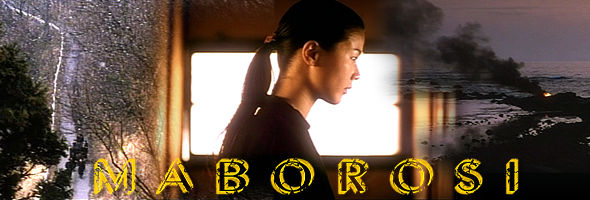
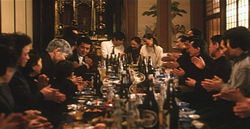 Here he tackles the many difficult concepts involving spirituality, mortality, and man's relationship with nature, all set to a throbbing, haunting soundtrack reminiscent of Popol Vuh and other progressive European bands. Maborosi (full title: Maboroshi no hikari) follows the journey of Yumiko (Makiko Esumi), an urban woman who is forced to raise her child alone after the apparent suicide of her husband. Even after remarrying to Tamio (Takashi Naitoh) and relocating to the seaside, she finds herself unsatisfied and searches for a sense of meaning underneath all the mess of day to day life. The storyline may be nothing terribly groundbreaking (see Kieslowski's Three Colours: Blue for another variation), but the same certainly can't be said for the images concocted by the director and cinematographer, who unveil a seemingly endless series of tableux from the most basic elements.
Here he tackles the many difficult concepts involving spirituality, mortality, and man's relationship with nature, all set to a throbbing, haunting soundtrack reminiscent of Popol Vuh and other progressive European bands. Maborosi (full title: Maboroshi no hikari) follows the journey of Yumiko (Makiko Esumi), an urban woman who is forced to raise her child alone after the apparent suicide of her husband. Even after remarrying to Tamio (Takashi Naitoh) and relocating to the seaside, she finds herself unsatisfied and searches for a sense of meaning underneath all the mess of day to day life. The storyline may be nothing terribly groundbreaking (see Kieslowski's Three Colours: Blue for another variation), but the same certainly can't be said for the images concocted by the director and cinematographer, who unveil a seemingly endless series of tableux from the most basic elements. 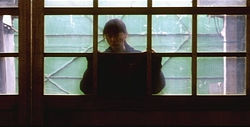 Bridges, silhouettes, and even the play of sunlight off the surfaces of wood and clothing turn the film into a dramatic tour de force, quiet yet devastating in its impact. A funeral sequence provides one unforgettable highlight, in which the distant procession is viewed at length from above in a snow-speckled forest and in silhouette across a vast expanse of beach. Fashion model Esumi looks perfect for the role, and her static, wooden quality actually brings an effective passive tranquility to the film which could have been destructive in another project.
Bridges, silhouettes, and even the play of sunlight off the surfaces of wood and clothing turn the film into a dramatic tour de force, quiet yet devastating in its impact. A funeral sequence provides one unforgettable highlight, in which the distant procession is viewed at length from above in a snow-speckled forest and in silhouette across a vast expanse of beach. Fashion model Esumi looks perfect for the role, and her static, wooden quality actually brings an effective passive tranquility to the film which could have been destructive in another project.
